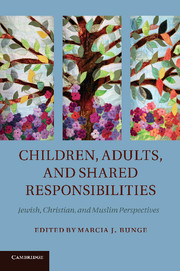Introduction
Published online by Cambridge University Press: 05 October 2012
Summary
Every person on earth once was or is a child. It is a role all human beings share. Not all human beings are siblings or parents. Not all are aunts or uncles. We all have different types of roles and responsibilities, whether at home, at work, or in civic life, and we live in different familial, social, and political contexts. Clearly, our conceptions of childhood vary widely across time and traditions. We do not even agree when childhood ends and adulthood begins. Yet, however we might define childhood or interact with children, we acknowledge that all human beings begin life as infants and develop as children. Furthermore, infants and children make up a significant portion of many communities. Even if we do not agree on a set age for the end of childhood, we can appreciate the importance of children just by noting that around the world today approximately one-third of humanity is under the age of 18.
Since all human beings once were or are children, children and childhood are bound to be central themes in ethical and moral reflection. Indeed, over centuries and across communities and cultures today, human beings have raised a number of fundamental questions about children and our commitments to them. Who or what is a child? How or why do we value children? What do parents owe their children? What are society's obligations to them? What are a child's basic needs? How do we ensure those needs are met? Who is responsible for a child if a parent dies or in cases of divorce? Who should intervene if a parent or guardian appears to neglect or to exploit a child? Who can or should speak on behalf of a child? What are children's own obligations to parents and the wider community? What are their particular roles, capacities, duties, and responsibilities? When should a child take on adult responsibilities? When does childhood end and adulthood begin? Do children themselves have rights? Does the international community have responsibilities to children? How far do our obligations to children outside our families or local communities extend?
- Type
- Chapter
- Information
- Children, Adults, and Shared ResponsibilitiesJewish, Christian and Muslim Perspectives, pp. 1 - 16Publisher: Cambridge University PressPrint publication year: 2012



